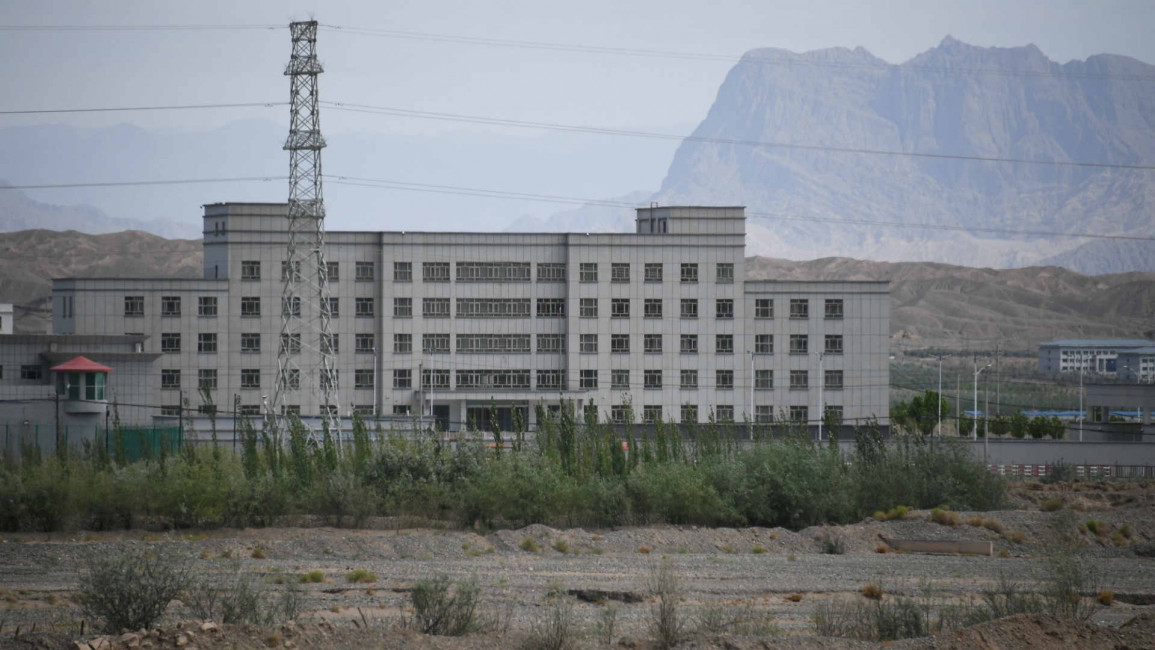Kazakhs despair for relatives missing in Xinjiang
But she did not anticipate just how dire his fate was, or that it would be revealed during a spat online between US and Chinese diplomats.
Rights groups at the time of Adilgazy Muqai's disappearance were sounding the alarm over a mushrooming network of facilities for the massive incarceration of mostly Muslim minority citizens in Xinjiang.
Kaken heard that her husband had fallen victim to the system. But three agonising years later, she learned he had met an even worse judgement: a nine year prison sentence for extremist crimes.
"I am so worried. The Chinese (authorities) will destroy him in jail," Kaken, a China-born ethnic Kazakh who is now a Kazakh citizen, told AFP through tears, pressing her two young daughters tightly to her body.
Beijing has robustly defended its policies in the Xinjiang region where more than one million people - mostly Muslims from Turkic speaking groups like Uighurs and Kazakhs - have been rounded up on vague extremism and separatism pretexts, rights groups say.
China claims the sprawling network of detention centres are vocational "training" facilities used to counter extremism where attendance is voluntary.
Yet in neighbouring Kazakhstan, 44-year-old Kaken is just one of a growing number of relatives to discover their missing family members are not in the centres as previously thought, but serving hard jail time instead.
'Full of lies'
Kaken and her husband, a retired oil worker, moved to Kazakhstan when she was pregnant with her youngest child, now three, after hearing reports that Xinjiang authorities were forcing women from minority groups to have abortions.
But 47-year-old Muqai, who had right of residency in Kazakhstan but was not a passport-holder, was lured back to his native region in May 2017 by his former employers.
They said the company pension that his family subsisted on could be cancelled if he failed to attend a meeting.
|
|
When news of Muqai's sentence finally emerged three years after his disappearance, it came from an unlikely source - a senior diplomat of the country that had jailed him.
China's ambassador in Kazakhstan Zhang Xiao told a state-owned news outlet that Muqai was sentenced to nine years on extremism charges, and in the same interview dismissed Kaken's account of her family's ordeal, which was reprinted by the US embassy in Kazakhstan.
Her story was "full of lies, without a single sentence of truth," he told the Global Times, a Chinese newspaper.
Kaken, who sews clothes and accepts charity to pay rent for a studio apartment in the provincial town of Uzynagash, around 60 kilometres from Kazakhstan's largest city Almaty, insists her husband is innocent.
"His only crime is his Kazakh identity," she told AFP.
'Few are truly free'
Despite close relations between the two governments, Kazakhstan has emerged as a hub for activism against Beijing's policies in Xinjiang, where thousands of Kazakhs have family ties.
That was largely due to the Atajurt rights group, which posted video testimonies recorded by hundreds of Kazakhs whose relatives had gone missing in the western region.
The group came under pressure from Kazakh authorities, who have refused it registration, with one of its leaders only beating jail on extremism charges after foreign media coverage and public outcry.
In 2019, China began boasting that most citizens had "graduated" from the centres, after Kazakhstan said Beijing had allowed hundreds of ethnic Kazakhs with Kazakhstan residence permits to leave China and reunite with families across the border.
Many in Kazakhstan believe the video appeals and the media attention they attracted played a role in pressuring Beijing.
Yet Mehmet Kasikci, a doctoral student at the Arizona State University who volunteered with the group, told AFP that other Kazakhs began hearing their relatives had received jail sentences not long after this wave of releases.
"Yes, hundreds of thousands have probably been released from the camps, but few are truly free, and more importantly hundreds of thousands have also been sent to official prisons," he told AFP.
'Deep regrets'
Baibolat Kunbolat was among those to record testimonies in the group's offices and write letters of appeal to the Kazakh government after hearing that his 30-year-old brother, Baimurat Nauryzbek, had been interned in one of the "training" centres.
But he first did so in late 2019, after others had already been campaigning for more than a year.
|
|
He told AFP he had held back at first out of respect for the "neighbourly relations" between Kazakhstan and China.
His brother's ten-year sentence for inciting racial hatred was confirmed to him in February by a member of China's mission in Kazakhstan, Gu Ming, after Kunbolat resorted to picketing the consulate in Almaty to demand Nauryzbek's freedom.
The diplomat told Kunbolat his brother was convicted in 2018 over an internet forum post that he allegedly wrote in 2012 as well as other posts.
Gu also informed Kunbolat that the embassy would "engage with the Kazakhstan government to have action taken against you" if Kunbolat continued his protests, which Gu said could negatively affect Nauryzbek's "reform".
China's embassy ignored a request to confirm the correspondence via the WeChat messaging app, which Kunbolat showed to AFP.
"We waited almost a year (to raise Nauryzbek's case) because there were rumours that the maximum time in a camp is a year," Kunbolat said. "We deeply regret this now."
Follow us on Facebook, Twitter and Instagram to stay connected

![A pro-Palestinian encampment at Columbia persists, despite recent arrests. [Brooke Anderson/The New Arab]](/sites/default/files/styles/image_330x185/public/2024-04/417084c8-3251-4705-8422-058fca1d5709.jpg?h=ddb1ad0c&itok=T2cXVfXy)

